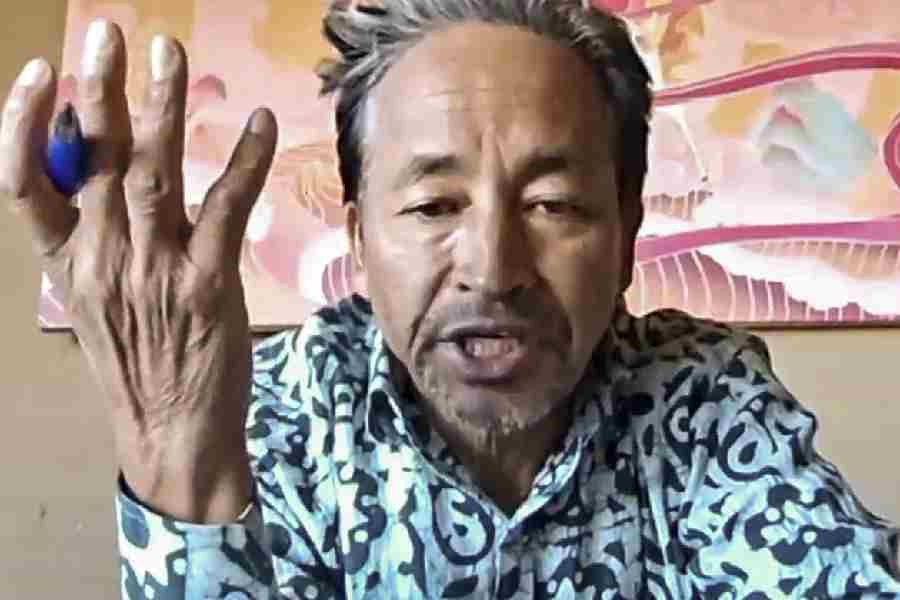Celebrated innovator, climate activist and Ladakh statehood campaigner Sonam Wangchuk was arrested from his home in Uleytokpo village on Friday, shortly before he was to address a news conference.
The Magsaysay awardee, the foremost Ladakhi voice on many issues, has been charged under the stringent National Security Act that allows preventive detention without bail for up to a year, sources said. A police source said Wangchuk had been flown out of Ladakh to an undisclosed location.
“It’s a very unfortunate incident. People are of course angry,” Ladakh Buddhist Association (LBA) president Chering Dorjey told The Telegraph over the phone.
Dorjey, who had resigned as Ladakh BJP chief in 2020 amid concerns over the region’s diminishing powers, confirmed that Wangchuk was arrested from his home in Uleytokpo, which is over 50km from Leh town.
Wangchuk, spearheading alongside the Leh Apex Body a yearlong campaign for statehood and Sixth Schedule status for Ladakh, recently held a weeks-long hunger-strike in Leh town to press the demands. The LBA is a key constituent of the Leh Apex Body.
Wangchuk’s arrest comes two days after violent statehood protests in Leh — when four people died in alleged firing by the security forces — and follows the arrests of dozens of others.
The die was cast against Wangchuk on Wednesday itself when the Union home ministry accused him of instigating the violence with his “provocative statements”, and later cancelled the foreign funds licence of an NGO he had founded.
Wangchuk had announced a news conference around 2.30pm on Friday but a large contingent of Ladakh police raided his home and arrested him, sources said.
Shortly before his arrest, a defiant Wangchuk told a national TV channel that he would be happy to be arrested for the cause he represented. He had warned that a jailed Wangchuk would be as big a problem for the Centre as a free Wangchuk.
“(It will show) how this country is run that a man like me is in jail while corrupt people are roaming freely. That will be a great scene for the country to see,” he had said.
The past three days’ developments suggest the BJP-led central government has adopted a new hard line against Ladakh’s Buddhist population, which had for decades championed Indian nationalism amid the brazen display of secessionism in neighbouring Kashmir.
The Buddhists had cheered Jammu and Kashmir’s loss of special status, and its dismemberment with the creation of a separate Union Territory of Ladakh -- until it dawned on them that the region was now vulnerable to new dangers from the mainland.
During Wednesday’s protests – the biggest violence Ladakh had seen in decades – high-profile offices of the BJP and the hill development council were torched, as were many vehicles.
Local sources said there was no violence on Friday.
Lieutenant governor Kavinder Gupta had on Wednesday said that Leh was under curfew, although the police say they have imposed Section 164 of the BNSS, which prohibits the assembly of five or more people.
Opposition parties condemned Wangchuk’s arrest, with Valley politicians pointing to a Kashmir parallel.
Jammu and Kashmir chief minister Omar Abdullah said Wangchuk’s arrest was unfortunate but not surprising. He asked whether it was difficult to understand why the Centre had failed to fulfil its promises.
The BJP’s manifesto for the 2019 general election had promised Sixth Schedule status for Ladakh.
Former Jammu and Kashmir chief minister Mehbooba Mufti said Wangchuk’s arrest was deeply disturbing.
“A lifelong advocate of peace, sustainability and truth is being punished merely for demanding that promises be kept. Today, Leh is under curfew with internet shut down a grim echo of what Kashmir has long endured,” she said.
Ladakh MP (Independent) Haji Hanifa condemned Wangchuk’s arrest for leading what he described as a peaceful agitation.
Congress general secretary Ghulam Ahmad Mir accused the Leh administration of mishandling the situation and said the arrest was “unwarranted”.
“He (Wangchuk) is a respectable person who has always believed in the Gandhian ideology,” Mir told reporters in Anantnag.
Wangchuk had been awarded the Ramon Magsaysay Award in 2018 for his transformative work in education and community development in Ladakh.
Wednesday’s home ministry statement said: “It is clear that the mob was incited by Sonam Wangchuk through his provocative statements. Incidentally, amidst these violent developments, he broke his fast and left for his village in an ambulance without making serious efforts to control the situation.”
The ministry alleged that Wangchuk’s references to the Arab Spring and Nepal’s Gen Z protests had stirred mob fury.
Wangchuk has denied the allegations and said the government was looking to scapegoat him.
On Thursday, he said he had learnt from “good sources” that the Public Safety Act would be invoked against him so that he could be detained for two years without trial or bail.
“I don’t fear detention. The police can come anytime to arrest me. I think my detention will awaken the country more than my freedom,” he said.










